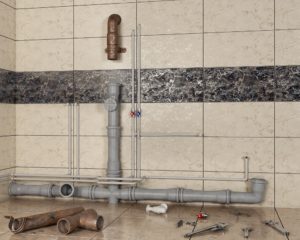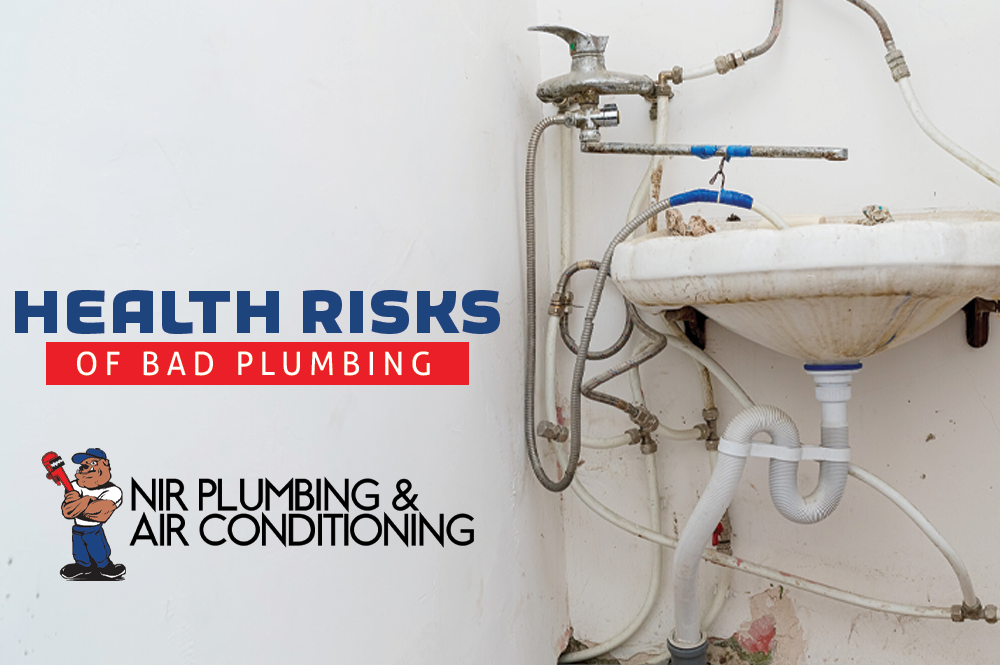[vc_row][vc_column width=”1/1″][vc_column_text]Health risks associated with bad plumbing + tips on how to avoid a plumbing nightmare[/vc_column_text][vc_column_text]
One of the most common and least desirable effects of a bad plumbing system is the spread of disease.
Most wastewater is filled with bacteria and other pathogens. With faulty plumbing, these hazardous materials could leak into the environment and subject you to hordes of disease-inducing pathogens. This can result in poor water quality which can result in life-threatening health issues especially for people who suffer from respiratory disorders.
Now add in the “perks” of a malfunctioning plumbing system (leaking pipes, foul-smelling water, and mold/mildew) and you’ve got more than a plumbing catastrophe in your home.
But what constitutes a “bad” or malfunctioning plumbing system? If you’ve experienced the following, you might have bad plumbing:
-
Indoor leaks
-
Clogged drains
-
Sewer backups
-
Rusted water heaters
-
Outdated faucets
And the accompanying health risks are guaranteed to only make living conditions worse.
We encourage you to take a look at this article for more details about ways that bad plumbing can make you sick though we’ll be addressing most of the health risks in this article.[/vc_column_text][vc_column_text]
INDOOR LEAKS
[/vc_column_text][vc_column_text]
TL;DR: Mold is just no good. Whether it’s on bread or in your walls.
A malfunctioning plumbing system is going to leak, and when it does and no attention is given to the leaks in the house, it’ll create the ideal atmosphere for molds.
This can be a major problem for people with asthma and can also cause allergic reactions that lead to other respiratory disorders.
Imagine having your whole family sick for months with none of your symptoms clearing up — this is a telltale indication that your home is being infested with mold.
Remember: Mold doesn’t care about the size of the leak — it simply doesn’t discriminate! Seriously. Even if the leak is the size of a pin hole, if it persists long enough within the wall cavities of your home where the water is stagnant, mold problems could arise.
And the negative health effects (plus the very serious damage it does to your home) is more than enough reason to get that leak repaired.[/vc_column_text][vc_column_text]
CLOGGED DRAINS
[/vc_column_text][vc_column_text]
Clogged drains can lead to many problems — and by now you know just about everything we’re discussing in this article can lead to “many problems.” This one is dealing with unpleasant odors (b.o. of the home… yuck).
The bad smell that comes from blocked drains is likely the result of biological growth spreading through your plumbing system instead of being flushed away… just appetizing… not!
How do I know my drain is clogged?
If water in your showers has started to drain slowly or if the kitchen sink is accumulating unusual amounts of food residue, you might have clogged drains.
You can easily clean up the mess left behind by a clogged drain, but it is more important to address the root cause of these clogs (and hopefully it’s not a literal root or some other weird item clogging your drains).
Clogged drains provide the perfect breeding ground for germs and stagnant water in your drains may attract insects and other pests that can transmit diseases to your family members, too.
Keeping drains clean is a year-round task. In order to minimize your exposure to harmful germs, it is important to clean the drain plugs weekly. Install traps at such places to prevent hair, food scraps, and other large items from blocking the drains.[/vc_column_text][vc_column_text]
DAMAGED SEWAGE SYSTEM/SEWER BACKUPS
[/vc_column_text][vc_column_text]
Sewer backups are one of the nastiest plumbing problems to ever exist (well, anything dealing with plumbing is pretty gross, but sewer things in particular rank high).
The most bothersome issue with a sewer backup is that it can make people and pets living in that house sick in a short period of time (the fact that it requires excessive cleaning is a given).
Sewage water contains bacteria, viruses, and other contaminants (as expected) that can contribute to a wide range of health issues (also as expected).
If your septic system isn’t properly maintained, these contaminants may spread to your drinking water. And the thing is that these contaminants are so tiny that they can pass through water filters!
Hepatitis, salmonella, and E. coli are part of the Incognito Contaminant group and can pose health risks if you have a damaged septic system.
Also, consuming or bathing with contaminated water from a poorly maintained or damaged plumbing system can cause nausea, intestinal problems, and immunity weakness.
Other health issues linked to exposure to a sewer backup:
Gastroenteritis:
Inflammation of the stomach and the intestines. Can cause vomiting and diarrhea.
Hepatitis:
Can cause discoloration of skin due to failure of liver. Can also cause inflammation of the liver and jaundice.
Related article(s): Hagerstown Heating & Cooling: 3 Plumbing Problems That Can Affect Your Health
[/vc_column_text][vc_column_text]
RUSTED WATER HEATERS
[/vc_column_text][vc_column_text]
Water heaters require proper maintenance to stay in good condition (as does everything in life). But even the water heaters develop rust in their interiors over time.
This is because nearly all water heaters have a sacrificial anode inside that attracts the electrolytes in tap water. This rod is highly reactive and will rust before the metal lining of the water heater. [Source]
This leads to sediment buildup along with low water pressure. Sediment buildup in old heaters can not only cause health concerns but will also damage the water heater. It will cause your water heater to work overtime and consume more energy. This means that the metal chassis of your heater will be under a lot more stress than it was designed for.
When parts of the water heater simply no longer have the strength to function as well as they once did, rust can enter the water supply of your home in some cases.[/vc_column_text][vc_column_text]
OUTDATED FAUCETS
[/vc_column_text][vc_column_text]
Many of us love the aesthetic of an old home — they have a personality, history, and they tell a story that gives you a sense of place and time and a perspective on where you fit in this huge, sometimes impersonal world. (We’ve got to get back to bad plumbing, but you’re welcome to read more about lovely old houses here.)
If you live in an old house, it’s not all storytelling and charm… you have to remain vigilant about its plumbing system.
Older homes usually have outdated plumbing fixtures with plumbing systems that tend to deposit lead in them. This means lead can also enter your drinking, bathing, and cooking water. (Awesome… not.)
Even small amounts of lead are toxic and poisonous.
The great thing is that outdated faucets can be replaced easily. Our suggestion: choose a lead-free faucet for your home to immediately minimize the chances of lead exposure.
Related article(s): bluefrogTM Plumbing + Drain: How Plumbing Problems Can Raise Health Concerns
[/vc_column_text][vc_column_text]
IN CONCLUSION
[/vc_column_text][vc_column_text]
Whether its the seeping sewage leak or the mold, prolonged sickness or colored water coming out your faucet, that kind of plumbing malfunction is not acceptable.
-
A malfunctioning plumbing system will have you calling sick out of work.
-
Foul-smelling water from your faucet is an indication that there is a leak from your sewage pipe contaminating your water.
-
In severe cases of contamination, your whole plumbing system will need to be realigned or your pipes replaced.
If you haven’t had your home inspected for some years, have a professional take look at your pipes. Your health is too important to just ignore the situation.
Remember that our mission as plumbers is to fight for a healthy, happy home — and that means putting in the work to ensure that your home is both healthy and happy.[/vc_column_text][/vc_column][/vc_row]


